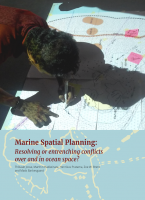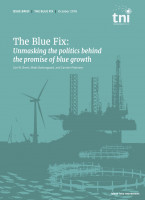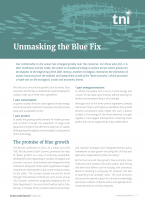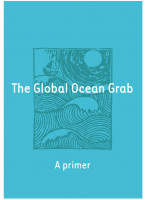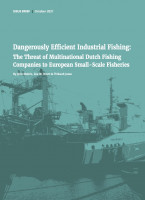Troubled Waters How the ‘blue economy’ perpetuates historical injustices in Mauritius
Regiones
This report examines the history and trajectory of the concept of the blue economy and MSP. To gain a more detailed understanding of the characteristics of the blue economy at the country level, the report focusses on the ocean economy of Mauritius.
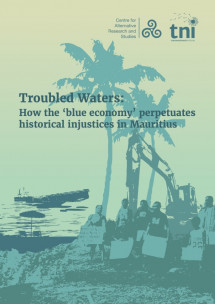
Descargas
Autores
Download the full report here.
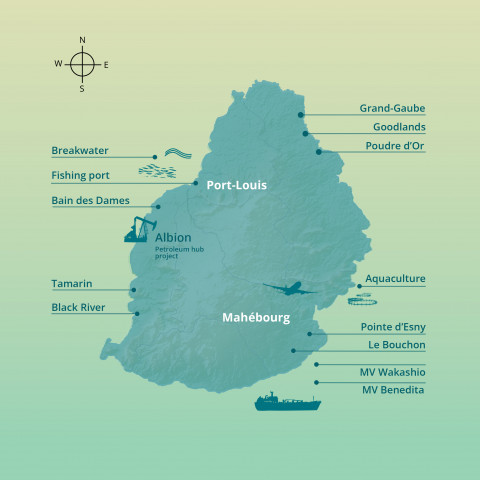
Introduction
Oceans have become new frontiers for economic growth, seen as an opportunity for capital investment and profits to be derived from vast untapped resources – beyond fish stocks. The concept of the blue economy or blue growth, which can be traced back to the United Nations Conference on Sustainable Development held in Rio de Janeiro in 2012, has gained in popularity in recent years and is used to place oceans more firmly on the agendas of governments, inter-governmental organisations and the private sector. At the same time, Marine Spatial Planning (MSP) – i.e. carving up the seas and coastlines into sites for particular use or exploitation – has become the preferred form of governance to continue expanding the so-called ocean economy.
This report examines the history and trajectory of the concept of the blue economy and MSP. To gain a more detailed understanding of the characteristics of the blue economy at the country level, we focus on the ocean economy of Mauritius. Located in the western Indian Ocean and surrounded by a sovereign ocean territory approximately 1,000 times bigger than its combined landmass, Mauritius is one of the countries that is leading and advancing the concept of the blue economy. The case of Mauritius exposes the gulf between the government’s promises of triple benefits, and the real implications of the ocean economy for people and the environment.
The case of Mauritius is of particular interest because inter-governmental institutions portray the country as one of the ‘Champions for the Blue Economy’, as one of only three African countries doing well in the blue economy, and as a good example of ‘how private sector-led growth in a stable macroeconomic and institutional environment is thriving’. This glamourous international image of the Mauritian blue economy not only contrasts with the realities on the ground, but also shows how some of the most influential proponents of the blue economy apply the concept to advance their own political and economic agendas while turning a blind eye to the negative impacts on both people and nature.
The research for this report started before the COVID-19 pandemic and the Wakashio oil spill, and while 2020 will go down in history as the worst year since independence, Mauritius was already suffering from profound climate-related, environmental, social and economic crises. The analysis is therefore just as relevant as before the outbreak of the pandemic. As part of the research, the author travelled the country for three weeks, participated in public events on ocean issues and conducted interviews with fishers, port workers, private-sector representatives, union leaders, politicians, academics and other Mauritians actively involved in non-government organisations (NGOs). The report is intended to trigger critical debate and assist the working people of Mauritius to choose the right path towards a brighter future for people and for the natural environment, in particular the ocean.
The first section of the report highlights the importance of the ocean as as territory for capital investment and accumulation, and unpacks the concept and history of the blue economy. Section 2 looks into the characteristics of the ocean economy in Mauritius and the government’s plans for advancing the ocean’s share in the total national economy. As a Small Island Developing State (SIDS), most of the country’s economic activities are connected to the ocean as most imported goods (food, oil and other material needs) arrive by ship and a significant proportion of working people are directly or indirectly connected to the sea. An estimated 7% of the labour force works in the fisheries sectors, more than 9% in tourism and below 1% in Mauritius’ ports. The World Bank estimates that the total ocean economy comprises around 10% of the national economy with tourism being the largest contributor (70% of the ocean economy). Port activities is the second largest ocean sector (20%) and fishing and fish processing comes third. Other sectors, such as oil, gas and aquaculture, feature prominently in the government’s plans.
Section 3 looks at Marine Spatial Planning (MSP) and how this policy instrument has become a key driver in advancing the ocean economy. In theory, MSP allows for broad participation of all actors with a ‘stake’ in the ocean and can be used to balance economic growth with environmental protection and social development. However, as in the case of Mauritius, MSP is being used as a tool to privatise the ocean and allocate concessions to the most powerful actors. The section shows that although MSP has become a high political priority of the Prime Minister’s Office, most Mauritians know nothing about it.
Section 4 briefly looks into capital accumulation in the commodity trade (sea transportation) and sugar economies since early colonisation and how this laid the foundations for a small elite class of just a few families and companies that control a significant share of the national economy and hold significant political power. Section 5 explores the specific case of one company to illustrate how capital and political power have become centralised over a period of two centuries. In 1830, the Blyth Brothers formed a company which gradually expanded and has recently undergone a series of mergers and acquisitions. This centralisation process created IBL Ltd., the largest company in Mauritius in terms of employees and turnover and by far the biggest player within its fishing industry.
Fisheries is important in the ocean economy, but while large-scale fishing and aquaculture receive considerable government attention and support, small-scale fishing is less visible. Section 6 sheds light on the cultural and socio-economic importance of small-scale fishing by tracing its history and documenting its significant, yet unrecognised, contribution to the broader Mauritian economy. It underlines the political marginalisation of small-scale fishing, which is rooted in the colonial era.
It is widely recognised that fishing and marine life are in crisis. Section 7 addresses the sources of pollution and climate change which have a negative impact on all marine life and lead to diminished fish stocks regardless of the scale of fishing activities. It argues that overfishing is used to explain the deteriorating state of fish stocks while overlooking the negative impacts of climate change and other human-induced forms of environmental destruction; and that policy and management responses first and foremost aim to reduce small-scale fishing, but ignore polluting and carbon-emitting industries such as textile, agriculture and tourism.
The concluding section connects the international rise of the blue economy paradigm with the history and future plans for the ocean economy in Mauritius. It shows how the government, along with influential corporations, uses the concept of the blue economy to reshape the Mauritian ocean economy on the basis of large-scale public and private investments. Facilitated through MSP, a new private property regime for secure investments in the ocean sectors is gaining ground, but whereas MSP is intended to be inclusive and democratic the case of Mauritius also shows how such principles are watered down in geopolitical and security developments that take place behind closed doors. Influential international players are using the Mauritian case to showcase and build further support for the blue economy concept. The contradiction between the promise of prosperity under a Mauritian blue paradigm and realities on the ground points to a clear case of what has been referred to as Ocean Grabbing. In this context, the working people of Mauritius continue in their struggle to realise their own alternative vision.

